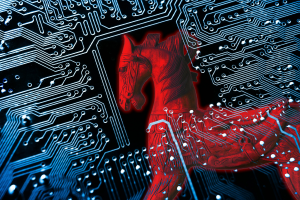In the previous post in this series, I outlined how cybercriminals will use the holiday season to victimize unwary consumers and target businesses. They will also dive deeper into leveraging devices connected to the Internet of Things (IoT). The long-term outlook expands their reach to more bold and potentially more lucrative pastures.
Rise of blockchain
During the next year, blockchains are poised to take on the world of finance, commerce, health care, and potentially government services—in which transactions must have a permanent record and can be seen by the masses. Originally started as the backbone for the emergence of cryptocurrencies like Bitcoin, blockchains can be used for so much more. Imagine purchasing items and having a permanent record of your investments. Land titles in parts of the world where governments come and go with frequency will persist even after a regime change, as they are part of an unalterable distributed public record. Stock trading by individuals could happen at lightning speed, not requiring an account at one of the big trading houses to process your order and take a fee. Your entire personal medical profile and records may be encrypted, but available to any doctor at a moment’s notice if you need them to be. Blockchains will likely be important in India, where government bank and spending accounts for each citizen could be protected from fraud and quickly process transactions.
The benefits are huge, motivating organizations to adopt the technology, which is already being explored in several sectors such as finance, commerce, digital contracts, and health care. Once embraced, blockchains will control and protect a mind-boggling amount of resources and power, guaranteeing they will be targeted by thieves, fraudsters, organized criminals, hacktivists, and even nation-states. This is where the true test of technology will be tempered. Like encryption before it, the math is solid, but we’ll see the vulnerabilities in implementations. Adopters will feel growing pains, as not all blockchains will be equal when it comes to cybersecurity. The attackers will hunt the weakest in the herd for easy and profitable meals.
Social media rules our attention
The attention market has changed so much over the past few generations. Newspapers and magazines gave way to radio, then television, the Internet, and now social media platforms. There is massive value in capturing people’s attention. It shapes our perceptions of justice, tempts us with purchases, cajoles us into trust, fuels the fame of celebrities, and is the lens we see the world through. It is powerful on so many levels, which it is why it will be targeted by all manner of digital threats.
Cyber threats recognize that social media is now seen as a tool to shift public sentiment. Expect terrorists, hacktivists, and nation-states to explore various exploits to support their objectives. The first battles will be around the ability to promote content, appear atop search results, shutter opposing views, and hack accounts of influential people. I also expect more campaigns to embarrass individuals and expose their private online activities. This will be done for profit and control, as well as for amusement.
Ransomware
Ransomware will continue to bring in tremendous amounts of money for cybercriminals. The number of ransomware engines will likely decrease, but the overall impact will go up. Like any software, every generation gets better and adds more features, which drives consolidation to the very best vendors. This trend will also play out with ransomware. Very soon, just a handful of engines will dominate the field. The result will be a greater overall impact as the best tools expand to target businesses, which are more lucrative when it comes to the extortion. Unfortunately, ransomware and extortion is a long-term problem.
Stressful holidays and New Year
Criminals, like the rest of us, enjoy having extra money to spend during the holidays. Expect more malicious activity during this end-of-year season, especially for those who are careless in their trust, as well as a sharp rise in fraudulent e-commerce, credit/debit card fraud, and identity thefts. Ransomware will expand from a mostly consumer scourge to also impact businesses for a much greater payoff. Social media will be both a target of attackers as well as an emotional sounding board on which we can express our discontent. Long-term attacks of a more strategic nature will test early blockchain implementations and explore ways to monetize pathetically weak IoT devices. Banks, ATMs, global financial transactions, and cryptocurrency will continue to be targeted for the foreseeable future, with ever bigger and bolder schemes.
Interested in more? Follow me on Twitter (@Matt_Rosenquist) and LinkedIn to hear insights and what is going on in cybersecurity.














